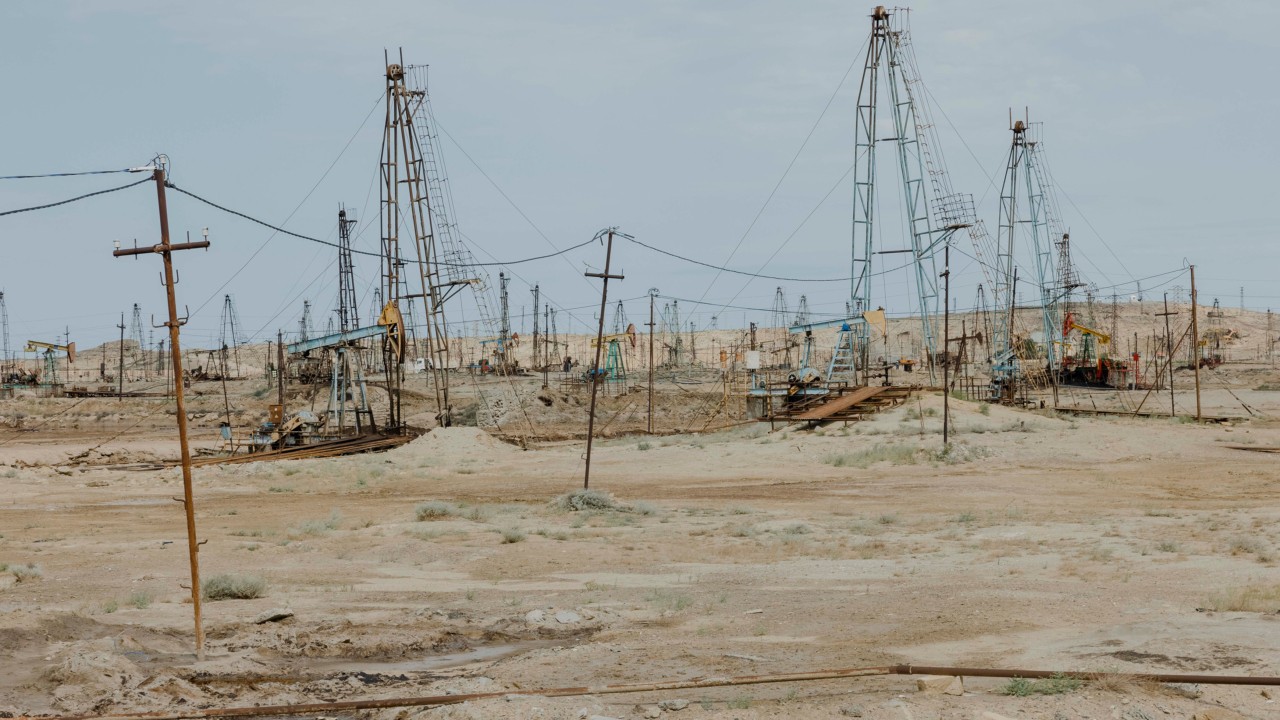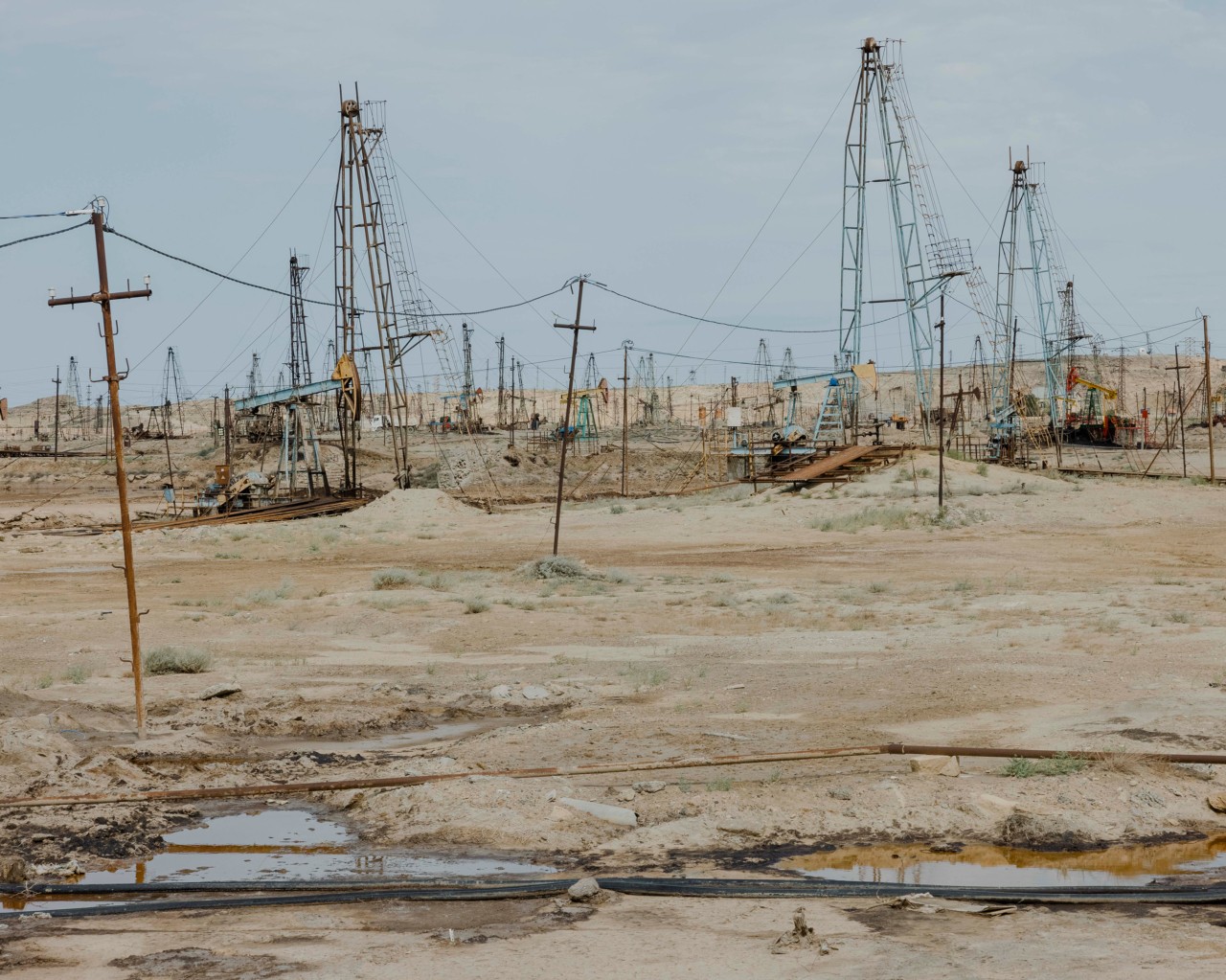

Photograph by Nanna Heitmann / Magnum
WORDS BY YESSENIA FUNES
In November, world leaders will coalesce in Azerbaijan to kick off the latest U.N. annual climate conference, better known as COP29. The host country has already come under fire for its alleged human rights abuses and fossil fuel economy, but one group of activists is making another important connection: Azerbaijan sends some of its offshore oil to Israel, where the military has been fueling its tanks and jets to viciously bombard and kill tens of thousands of innocent people in Palestine and Lebanon.
A recent investigation by U.K.-based anti-imperialist climate activist group Energy Embargo for Palestine and media outlet shado sheds light on how fossil fuel giant BP is profiting off the transport and sale of oil to Israel. Atmos sent BP multiple emails over several weeks requesting comment but never got a response.
“A lot of the military vehicles, the fighter jets Israel is using to bomb Lebanon and Gaza as we speak, depend on oil,” said Felix, an organizer with Energy Embargo for Palestine who worked on the report. He is using a pseudonym to protect his identity out of fear of retribution. “A fighter jet would not get off the ground without its oil.”
The report, which took the organizations four months to finalize, also makes historical connections between the Middle East, BP, and the British state, which was once the company’s majority owner. The authors hope to help the public understand how the world reached this point where death and destruction are avenues by which institutions maintain power and make money.
Ahead of COP29, and on the heels of the anniversary of the Oct. 7 Hamas attacks that left about 1,200 dead in Israel, climate organizers are heeding the calls of Palestinian voices and calling for an energy embargo for Palestine; they’re demanding accountability for the governments and private corporations that are funneling the oil Israel needs for its genocide. Their calls echo those of U.S.-based activists who have been targeting Chevron, which announced in February plans to invest $24 million into expanding its gas production to help Israel’s energy needs.
“We use this phrase: ‘If the weapon manufacturers are the fists of U.S. imperialism, then we understand the energy corporations provide this death machine its oxygen,’” Felix said. “So by cutting off the supply of oxygen, we would ultimately see the end of the genocide efforts as we know them, and it would be a huge blow to U.S. imperialism in the process.”
Azerbaijan was once the oil capital of the world. By 1901, the present-day capital city of Baku—the world’s first oil town—was producing more than half of the global supply of oil. The world was amid a pivotal transition at the time: the shift from coal to oil. And everyone wanted to enter this new modern age. Oil meant fuel for automobiles, buses, ships, and factories. From 1910 to 1916, the world energy system went from relying on oil for less than a tenth of its supply to over half.
Independence is still fresh for the people of Azerbaijan, which hugs the western coast of the Caspian Sea. They only declared their independence from the Soviet Union in 1991. Russia still hugs the country’s northern border, a geographical remnant of when Russia overtook parts of the country in the 19th century.
“If the weapon manufacturers are the fists of U.S. imperialism, then we understand the energy corporations provide this death machine its oxygen.”
As Azerbaijan embarked on its new independence from the Soviet Union at the turn of the 21st century, the U.K., the U.S., six other countries, and 13 oil companies (including BP) signed what they called the Contract of the Century, an agreement with Azerbaijan for foreign investors to tap into the region’s estimated 730 million tons of oil.
“History explains how we got to where we are now,” Felix said. “Understanding the history that has led us to this point allows us to see that this really isn’t a new phenomenon. Through an analysis of how major transnational oil corporations came to dominate early markets… while maximizing their own profits, we can understand essentially what we are calling for resistance against and what we are calling to challenge.”
As the investigation from Energy Embargo for Palestine clarifies, the Contract of the Century laid the foundation for the Baku-Tbilisi-Ceyhan (BTC) pipeline, which BP mostly owns and which supplies Israel with about 28% of its oil. The agreement, the report authors argue, gave BP and Western powers undue influence over the country—putting the private energy companies’ profits over the well-being of locals and the wider region.
Indeed, that’s how colonialism and imperialism work. Isn’t that the goal? To extract as cheaply as possible without consequence? To exhibit power over a place? To subject a people to suffering?
Now, the fallout of such decision-making has led to contradictions. While Azerbaijan has stood before the U.N. as a supporter of Palestine, and although the president has said Palestine needs its independence, the nation’s leaders continue to allow their oil to flow to Israel’s shores. So do Georgia and Turkey, the neighboring countries that the BTC pipeline cuts through before the oil boards tankers on the Mediterranean Sea destined for the historically Palestinian lands Israel is now occupying.
And U.S. imperialism—the force of expanding the U.S. empire through military might and political prowess—is evident here, too. The U.S. was the first country to recognize the state of Israel in 1948. In the years that followed, Israel became the country to receive the most economic and military aid from the U.S. Since Oct. 7, the U.S. has sent the country over $6 billion in aid. In August, the U.S. signed a new $20 billion military weapons deal with Israel, ensuring that Israel has access to some of the world’s most advanced weapon technology well into the end of this decade.
This weaponry comes at a cost. The people of Palestine and Lebanon aren’t the only ones who bear it.
The first two months of Israel’s attack on Palestine resulted in 281,000 metric tons of greenhouse gases released into the atmosphere. That number is undoubtedly higher now, after surpassing a year of violence. Each tank and fighter jet that sets off to destroy and conquer burns fossil fuels to operate.
When war breaks out, though, the energy markets go wild. War can literally boost oil prices: When Iran launched a retaliatory strike on Israel last week after Israel killed the leaders of Hamas and Hezbollah, oil prices jumped by nearly 5%.
“We all have a role to play in resisting the ways in which energy corporations are complicit in Israel’s ongoing genocide against the Palestinians.”
Meanwhile, world leaders are left with the monumental task of cutting emissions. That’s what they’re gathering in Azerbaijan to discuss: How can countries reduce their carbon pollution to meet the goals they agreed to when signing the Paris Agreement in 2015? Governments pledged to limit the planet’s warming to 1.5 degrees Celsius above pre-industrial levels. That means nearly halving current emissions by 2030, a deadline that’s fast approaching. And global temperature rise is already at 1.1 degrees Celsius. The planet is running out of time—and so are the people of Palestine.
Over 42,000 Palestinians have died since Oct. 7. In Lebanon, where Israel heightened its assault in September, over a million people have been displaced. Could an energy embargo actually help stop the madness? Atif Kubursi, a retired economics professor at McMaster University and former acting executive secretary of the U.N. Economic and Social Commission for Western Asia, believes so. He also believes that the players supplying oil and gas to Israel should be held accountable under international law.
“The International Court of Justice has already declared the Israeli occupation of Palestine is illegal, and therefore, anybody who would enable and provide comfort and support for the occupier is basically in contradiction and non-compliance with international law,” said Kubursi, who wasn’t involved with the Energy Embargo for Palestine investigation. “They are complicit in genocide, which is a crime against humanity… There should be punishment.”
For activists based in the U.K., the country that helped build BP, their responsibility is clear.
“We all have a role to play in resisting the ways in which energy corporations are complicit in Israel’s ongoing genocide against the Palestinians,” Felix said.
Fossil Free London organizer Rosie Latchford sees that connection plainly. In April, she was arrested in London for protesting at BP’s annual general meeting. She and her comrades arrived ready to paint their hands red to symbolize the loss of life since Oct. 7. The charges were ultimately dropped, but Latchford remains unwavering in her desire to see justice despite the increasingly hostile environment to climate activists engaged in civil disobedience in the U.K. She suggests BP should pay climate reparations for all the damage it’s caused or face some form of sanctions for its oil sales to Israel.
“There’s so many connections between BP and the genocide in Palestine,” Latchford said. “We strongly believe there’s no climate justice without a free Palestine. And when we say ‘climate justice,’ we mean the fight for people’s lives.”
It’s been a year of bombs and blood. Will we allow more of the same in the year that follows?
Israel’s War Machine Needs Oil. Should the World Cut It Off?